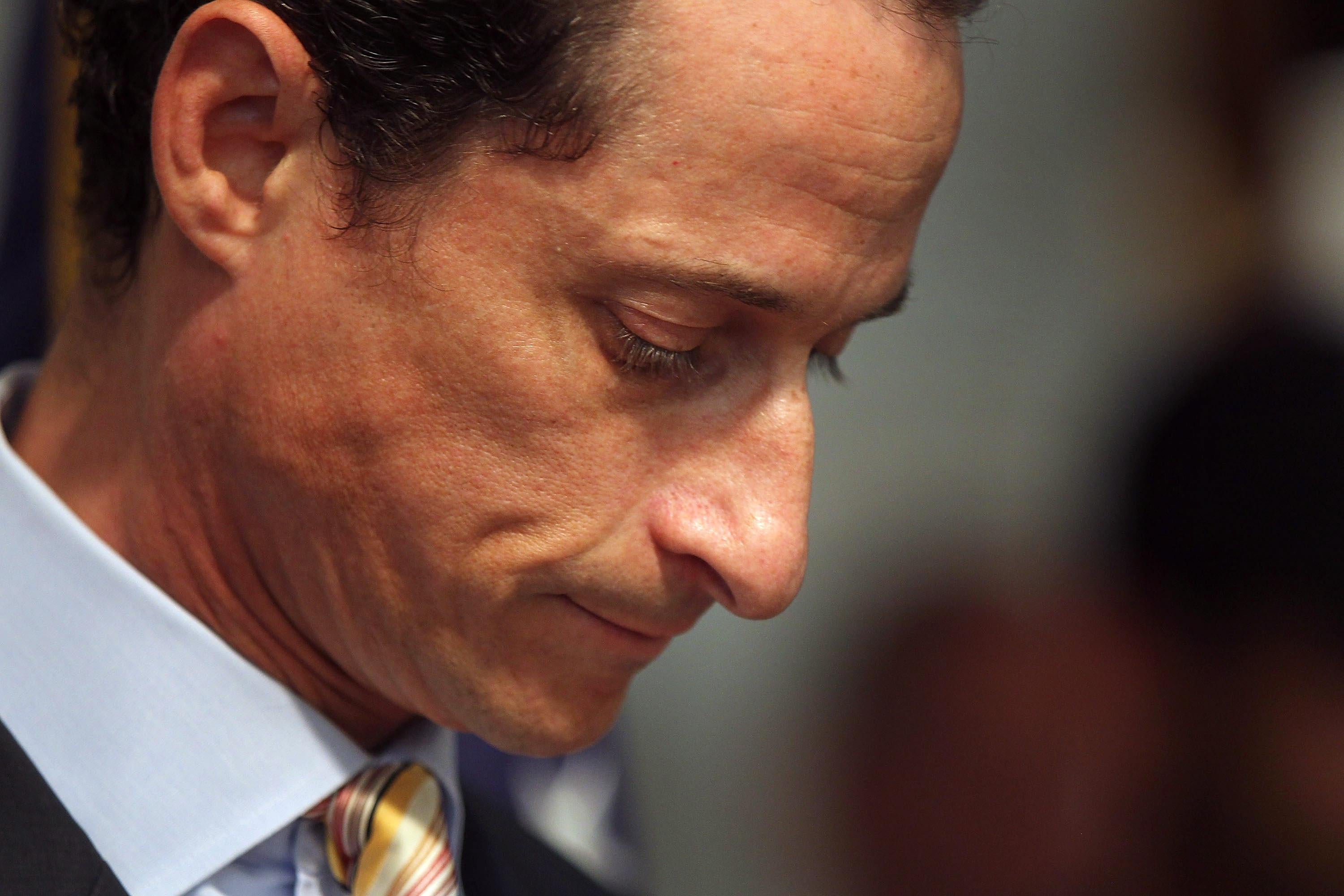This Sunday’s New York Times magazine has a surprisingly revealing cover story about former Congressman Anthony Weiner. I say surprisingly because it’s rare for anyone who has experienced a worldwide sex-related scandal to unburden himself to a reporter in a seemingly genuine way. Weiner did not mutter platitudes about fidelity or love, or give pat answers to questions about why he was sending lewd tweets of his package to strangers on the Internet. He seemed truly remorseful about putting his wife—Hillary Clinton aide Huma Abedin—through something so public and humiliating. He even cried twice during the interview. Certainly his admissions to writer Jonathan Van Meter were calculated (Weiner agreed to the interview because he’s thinking of running for NYC mayor), but the ex-Congressman would have to be a total sociopath to feign the emotions he displayed to Van Meter, and I don’t think he is.
I’ve always been in the camp that thought Weiner didn’t have to resign in the first place. He didn’t break any laws, and he didn’t even technically cheat on his wife. He just embarrassed himself and his family in a grand mal kind of way. But now, almost two years after the scandal broke, it’s obvious that this is a thoroughly modern gaffe we’ll see more of, and one that should be survivable both politically and personally.
Weiner is not the only politician who has been done in by online malfeasance. In 2011 Congressman Christopher Lee resigned after trolling for sex on Craigslist. We all live online now, and in a decade, I think these kinds of events will be non-issues. Everyone, except for perhaps the Amish, will have embarrassing or semi-incriminating digital evidence floating around. Part of what did Weiner in is that to many, his Tweeting naughty photos to strangers seemed new-fangled and threatening. People didn’t understand it. As Van Meter put it, people can understand a regular affair, but what Weiner did seemed “creepy.” Soon, the general public will understand it, because as the new technology becomes further ingrained, they’ll have done something similar.
My favorite mini-scandal from the 2012 election cycle didn’t even get much press. It was when the daughter of a Honolulu mayoral candidate set fire to a campaign sign from her dad’s challenger, and then used the fire to light a bong. Then she put a photo of the evidence on Instagram, like an idiot teenager would. That the scandal went nowhere—the daughter apologized and the opponent took it in stride—gives credence to the notion that these kinds of Internet embarrassments don’t have to destroy you.
The personal part of Weiner’s equation is evolving too. The Times article is also about how he and Abedin stayed together through this nightmare. She was pregnant when the scandal arose, and the two now seem to be fairly happily raising their son, Jordan. I was listening to a Savage Love podcast recently, in which sex and relationship columnist Dan Savage went on a long rant about how, if it’s emotionally possible for the people involved, married couples should try to get beyond a cheating partner. As Savage said in an interview a few years ago:
Folks on the verge of making those monogamous commitments…need to look at the wreckage around them—all those failed monogamous relationships out there (Schwarzenegger, Clinton, Vitter, whoever’s on the cover of US magazine this week)—and have a conversation about what it’ll mean if one or the other partner should cheat. And agree, at the very least, to getting through it, to place a higher value on the relationship itself than on one component of it, sexual exclusivity.
It seems like the younger generation is not only more technologically savvy, but also more accepting of what Dan Savage describes as “monogamish” behavior. Fewer people are getting married than ever before, and as marriage researcher Pamela Haag puts it, monogamy is being “deliberately rethought and re-evaluated by a post-romantic generation that sees the main function of marriage as friendship, an establishment of a home base—not sexual passion and fidelity, per se.” Abedin, quoting her boss and mentor Hillary Clinton, said “at the end of the day, at the very least, every woman should have the ability and the confidence and the choice to make whatever decisions she wants to make that are right for her and not be judged by it.” If Hillary’s recent ascendance is any evidence, the public gets over its judgment of women who stay with their husbands through scandals eventually.
